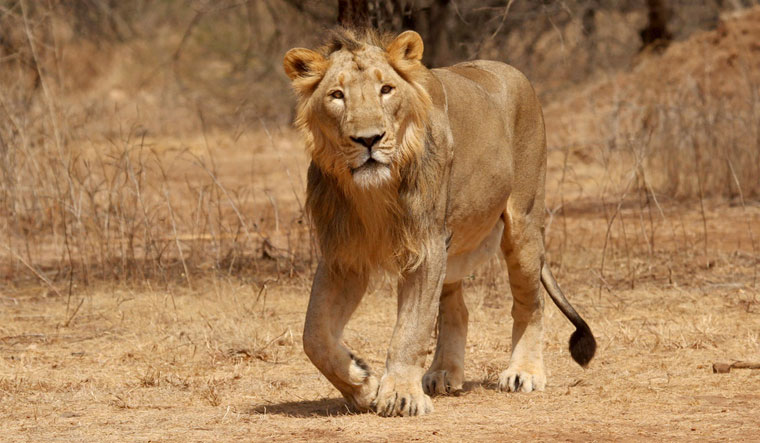Gujarat High Court Quashes 16-Year-Old Case Against Journalist For Allegedly ‘Disturbing Lion’ Near Gir Sanctuary


The Gujarat High Court has quashed a 2009 case registered against a journalist for allegedly disturbing a lion while it was feeding, “outside” the forest limits in Gir National Park and Wildlife Sanctuary.
In doing so the court observed that merely disturbing a lion would not fall within the ambit of hunting as defined under the Wildlife Protection Act. The court however remarked that while conduct would not amount to an offence, it indicated insensitivity and recklessness; it however took note of the remorse expressed by the petitioner.
It further observed that there was no complaint lodged against the petitioner as mandated under the act based on which cognizance could be taken by magistrate; in view of the legal bar prosecution could not have been initiated.
The petitioner, a journalist, had visited Gir National Park and Sanctuary in November 2009 along with two others who are affiliated with an NGO working in the field of animal and environmental welfare.
The order notes that the group had entered the forest with valid permits and in the company of an official guide. Later that night, while refueling his vehicle in the city area, the petitioner was informed by local villagers that a lion was seen consuming its prey in an agricultural field outside the sanctuary limits.
It was stated that the petitioner and his companions proceeded towards the location, which “falls within the revenue area and not within the forest boundary”. At that juncture, the petitioner and his companions were intercepted by the local Range Forest Officer, who, upon learning of the petitioner’s journalistic credentials, suspected him of conducting a sting operation.
A Forest Offence First Report was registered in the early hours of November 6, 2009 under Sections 2(16)(b)(defines hunting), 2(33)(defines vehicle), 9(hunting), 39(Wild animals, etc., to be Government property) and 51(Penalties) of the Wildlife (Protection) Act alleging that the petitioner had “disturbed a lion while it was feeding”.
There was no allegation or evidence of hunting; the incident location being outside the forest limits was corroborated by the Gram Panchayat’s Rojkam. The petitioner was released on bail and thereafter a charge-sheet was filed. It was submitted that the petitioner having realized the impropriety of his conduct, had expressed remorse and had even made a donation.
Disturbing a lion not hunting
Perusing the provisions, Justice JC Doshi in his order observed that rojkam prepared by the Forest Officer revealed that, during the intervening night hours—at a time when the official lion census exercise was underway—the petitioner was found in the vicinity of a site where a lion as feeding upon its prey.
“As per the allegations noted in the FIR, the petitioner and his companions were allegedly flashing lights from a Scorpio vehicle, thereby disturbing the lion in the act of feeding.However, even if the said facts, as recorded by the forest authorities, are taken at their face value, a bare comparison with the statutory definition of “hunting” under Section 2(16)(b) of the Wildlife (Protection) Act, 1972, clearly indicates that the act attributed to the petitioner does not fall within the scope of “hunting”, nor within its grammatical variations or cognate expressions as envisaged under the said provision. The definition of “hunting” contemplates acts such as capturing, killing, poisoning, snaring, or trapping of a wild animal, or attempts thereof, or actions that cause physical harm or destruction. Merely disturbing a lion, does not meet the threshold to constitute an offence of “hunting” under the Act“.
The court observed that the residual provisions—Sections 9, 39, and 51—which are premised upon the commission of an act of hunting or unlawful possession of wild animals or their parts, are not attracted in the absence of any foundational ingredient being satisfied.
The court however said that even if the petitioner’s conduct is unwise or imprudent, it does not satisfy the statutory prerequisites to constitute any cognizable wildlife offence under the scheme of the Act.
No complaint, cognizance couldn’t be taken
The high court further observed that Section 55 of the Act imposes a statutory bar on any Court taking cognizance of an offence under the Act except upon a complaint filed by the Director of Wildlife Preservation, the Chief Wildlife Warden, or any officer duly authorised in this behalf by the Central or State Government, or by a private person who has given a mandatory 60 days’ notice in the prescribed manner.
“In the instant case, it is an admitted position that the proceedings have been initiated solely on the basis of a police-style Forest Offence Report, and not by way of a complaint as required under Section 55,” the court noted.
The court also noted the public prosecutor’s submission though the FIR was registered by the Range Forest Officer, Talala, Junagadh, and subsequently culminated into a chargesheet filed by the Investigating Officer, the same would not fall within the ambit of a ‘complaint’ as defined under the aforesaid provisions.
“In this view of the matter, the learned Magistrate was legally precluded from taking cognizance of the offence in the absence of a complaint filed by an authorised officer under the Act. Consequently, subjecting the petitioner to the rigours of criminal trial, in such circumstances, would be a travesty of justice and an abuse of the process of law,” the court added.
Conduct not offence but was reckless; remorse expressed
At the same time, the High Court said that the undisputed conduct of the petitioner which, does not strictly amounts to an offence under the Wildlife (Protection) Act, “nonetheless reveals a disquieting insensitivity towards the natural habitat of a protected species“.
“As admitted, the petitioners disturbed a lion while it was feeding upon its prey during the night hours by flashing lights from a vehicle, thereby intruding upon its habitat and causing disruption. Though not constituting “hunting” as defined under Section 2(16)(b) of the Act, such actions can only be described as reckless and antagonistic to wildlife conservation ethics,” the court remarked.
The high court however noted that the petitioner while expressing his remorse voluntarily made a donation of Rs. 1 Lakh to the Gujarat State Lion Conservation Society, Junagadh, as a gesture of contrition and support for wildlife preservation.
It said that while this cannot retrospectively legalize an otherwise flawed prosecution, it is certainly indicative of a “corrective and reformative attitude deserving of due notice”.
The court thus quashed the FIR as well as all proceedings initiated therefrom.
It however made clear that the order shall not preclude the authorized officer under the Act from initiating or instituting appropriate proceedings against the petitioner, in accordance with law, on the basis of the material collected during the course of investigation.
Case title: MANISH BHUPENDRABHAI PANWALA vs. STATE OF GUJARAT & ANR

